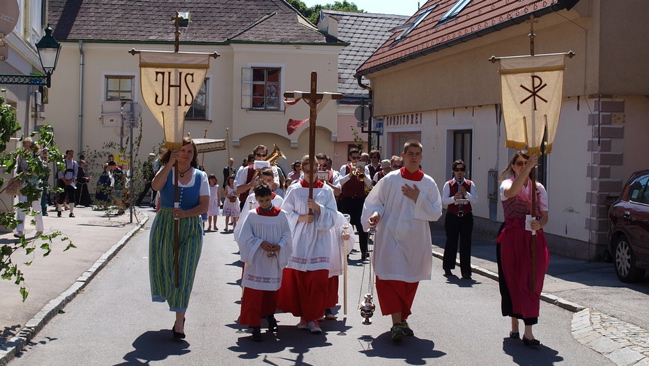SUNDAY, JUNE 3: Pentecost has passed for both Eastern and Western Christians, and today, the faithful observe the Sunday of All Saints and the Feast of Corpus Christi (respectively). While Western Christians observe All Saints’ Day in November, Eastern Orthodox Christians honor this feast on the Sunday following Pentecost. On this first Sunday of June, Eastern Christians honor all saints—known and unknown—and Western Christians set aside a day for sole veneration of the Eucharist, in the Feast of Corpus Christi. Note: The Feast of Corpus Christi is liturgically celebrated on the Thursday after Trinity Sunday—this year, May 31—but is moved to a Sunday in places where it is not a holy day of obligation.
EASTERN: SUNDAY OF ALL SAINTS
On the first Sunday following Pentecost, Eastern Orthodox Christians mark the Sunday of All Saints. What began as the Sunday of All Martyrs now includes all saints whose works honor God—the righteous, the prophets, apostles, martyrs, confessors, shepherds, teachers and holy monastics, both known and unknown. Eastern Christians honor them for their examples of virtue, and as intercessors for the behalf of the living with God.
WESTERN: THE FEAST OF CORPUS CHRISTI
Known also as The Most Holy Body and Blood of Christ, the Feast of Corpus Christi celebrates the tradition and belief in the body and blood of Jesus Christ, and his real presence in the Eucharist. While the Eucharist is recognized and honored on Holy Thursday, its celebration can be overshadowed by the approaching Paschal (Easter) Triduum. Thus a day was designated with the sole purpose of recognizing the Eucharist. At the end of Mass on the Feast of Corpus Christi, Catholic churches may hold a procession of the Blessed Sacrament, followed by a Benediction of the Blessed Sacrament.
ORIGINS: A DAY FOR THE EUCHARIST & JULIANA OF LIEGE
The institution of a day for the Eucharist in the church calendar began with the decades-long work of Juliana of Liege, a 13th-century woman of Belgium who was orphaned and raised by Augustinian nuns. With a special veneration for the Blessed Sacrament, Juliana reported having a dream of the church under a full moon, with one dark spot: the absence of a solemnity for the Eucharist. For 20 years, Juliana had visions of Christ, and she relayed these to her confessor. Word passed, and Pope Urban IV instituted the Solemnity of Corpus Christi on the Thursday after Pentecost for the entire Latin Rite. Pope John XXII promulgated a collection of laws in 1317 that made the feast universal.
